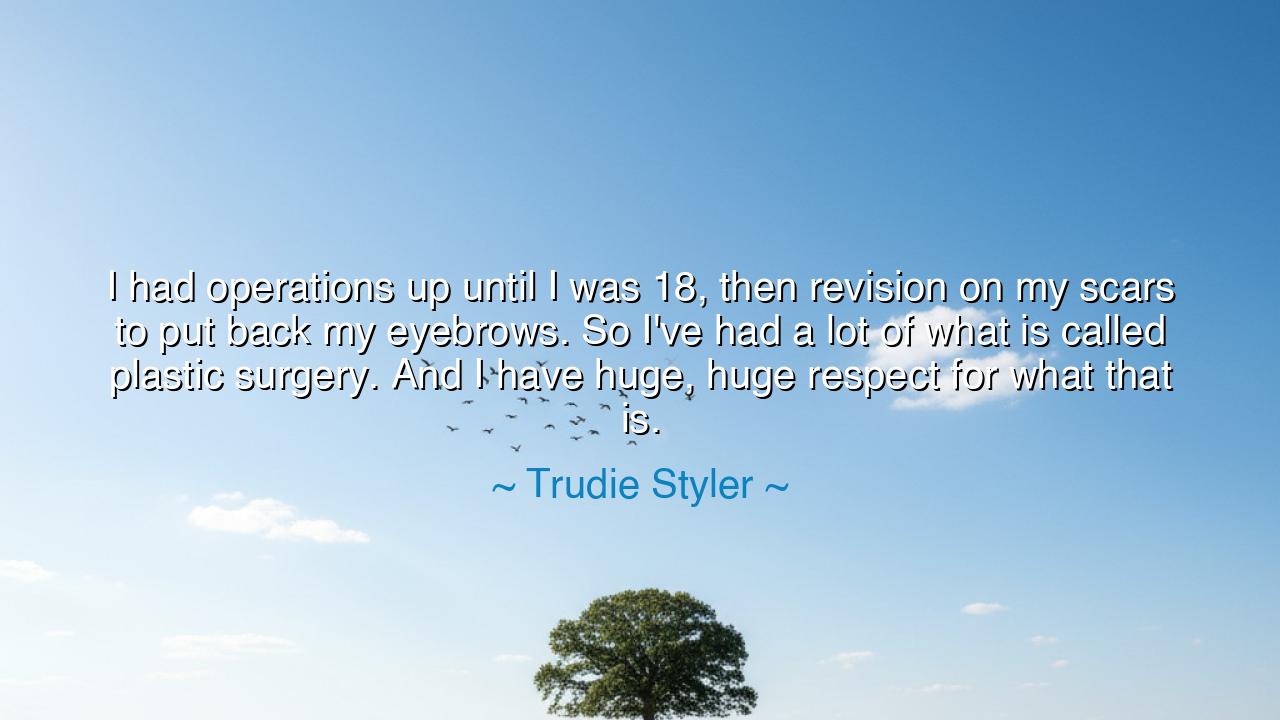
I had operations up until I was 18, then revision on my scars to
I had operations up until I was 18, then revision on my scars to put back my eyebrows. So I've had a lot of what is called plastic surgery. And I have huge, huge respect for what that is.






The words of Trudie Styler—“I had operations up until I was 18, then revision on my scars to put back my eyebrows. So I've had a lot of what is called plastic surgery. And I have huge, huge respect for what that is.”—speak with the voice of one who has walked through trial and emerged with reverence for the healing arts. They remind us that plastic surgery is not merely vanity, as many imagine, but a discipline born of compassion, designed to restore dignity, relieve suffering, and give back what injury or fate has taken away.
The ancients often said that the body is the temple of the soul, and when the temple is damaged, the spirit too may carry wounds. For Styler, the long years of operations were not a pursuit of perfection, but a fight to regain wholeness, to reclaim her face, her eyebrows, her sense of self. Each scar revised was not just a physical correction, but an act of renewal, a declaration that she was more than the pain written upon her skin. In her testimony, we hear not shame, but gratitude: a profound respect for the physicians who labored to restore her.
History bears witness to the nobility of this craft. During the Great War, countless soldiers returned from battle disfigured by fire, steel, and explosion. To face their families and communities with such wounds was agony beyond words. It was then that surgeons like Harold Gillies pioneered reconstructive techniques, giving shattered faces a second life. For those men, plastic surgery was not luxury but salvation. Styler’s story stands in the same lineage: proof that these skills, born of necessity, serve not vanity but the human spirit itself.
There is a quiet heroism in enduring repeated operations. Each one brings pain, fear, and uncertainty. Yet Styler’s reflection does not dwell on suffering, but on the gratitude she holds for those who helped her heal. This is wisdom: to see in one’s scars not only reminders of struggle, but also of the hands that worked to mend them. To honor the craft of healing is to acknowledge that medicine is more than science; it is compassion translated into action.
Her words also challenge us to look deeper. Too often, society speaks of plastic surgery with scorn, as if it were nothing but vanity or frivolity. But Styler reminds us that for many, it is survival. It is the difference between walking in shame and walking with confidence, between being trapped by injury and stepping free into life. Respect for what that is means respect for the courage of patients, the skill of doctors, and the profound human need to be seen not as broken, but as whole.
The lesson is luminous: never dismiss another person’s healing as trivial. Whether scars are on the skin or in the soul, the act of repair is sacred. If medicine can lift the burden of disfigurement, if it can return to someone the gift of looking in the mirror without sorrow, then it is not vanity—it is grace. Styler’s respect teaches us that the path to wholeness is worthy of honor, no matter the form it takes.
Practical action lies before us: speak with compassion about those who undergo surgery to heal what life has broken. Do not judge hastily, for you cannot know the weight of another’s scars. Honor the doctors and surgeons who devote their lives to restoring form and function. And in your own struggles, whether visible or hidden, remember that seeking healing is not weakness, but strength. To walk the long road of restoration, as Styler did, is an act of courage that deserves reverence.
So let us carry her words as a teaching. Scars do not define us, but they remind us of battles fought. And when medicine helps to soften those scars, it is not to erase the past, but to give strength for the future. Respect the craft, respect the journey, and above all, respect those who endure suffering with courage and emerge with gratitude. For in that gratitude lies the true beauty of the human spirit.






AAdministratorAdministrator
Welcome, honored guests. Please leave a comment, we will respond soon